Some Google Searches I, a San Francisco Parent, Have Done In the Past Week
I’m sleeping great, how about you


I’m sleeping great, how about you
Ten years ago, protesters took to the streets to slam San Francisco’s Super Bowl City and call for an end to homeless sweeps. As the game returns to the Bay this week, why are things so quiet?
This week we've got dunes, vintage animation, fonts, and paper fruit.
Sonoma County’s ‘Adopt a Corner’ program aims to protect undocumented day laborers from ICE.

Some of these interviews have been translated from Spanish.
One day a week, at around 6am, Eric Leland drives from his home in Petaluma to a certain gas station on a central corner across town. He and four to eight other volunteers load up a folding table with Spanish-language materials, like cheat sheets about civil rights in interactions with Immigration and Customs Enforcement (ICE) officers. Alongside these pamphlets are equipment like face masks, gloves, and earplugs for protecting workers at loud worksites. It’s a one-stop shop for the day laborers who congregate here each morning, hoping to be hired for a day’s work.
Those who speak Spanish stick around at the table, chatting with the day laborers who are gathering on the corner. The rest of the volunteers peel off to covertly observe key intersections on the main road, especially near the highway, as “legal observers.” They’re looking for federal government vehicles, whether from ICE or the U.S. Department of Homeland Security.
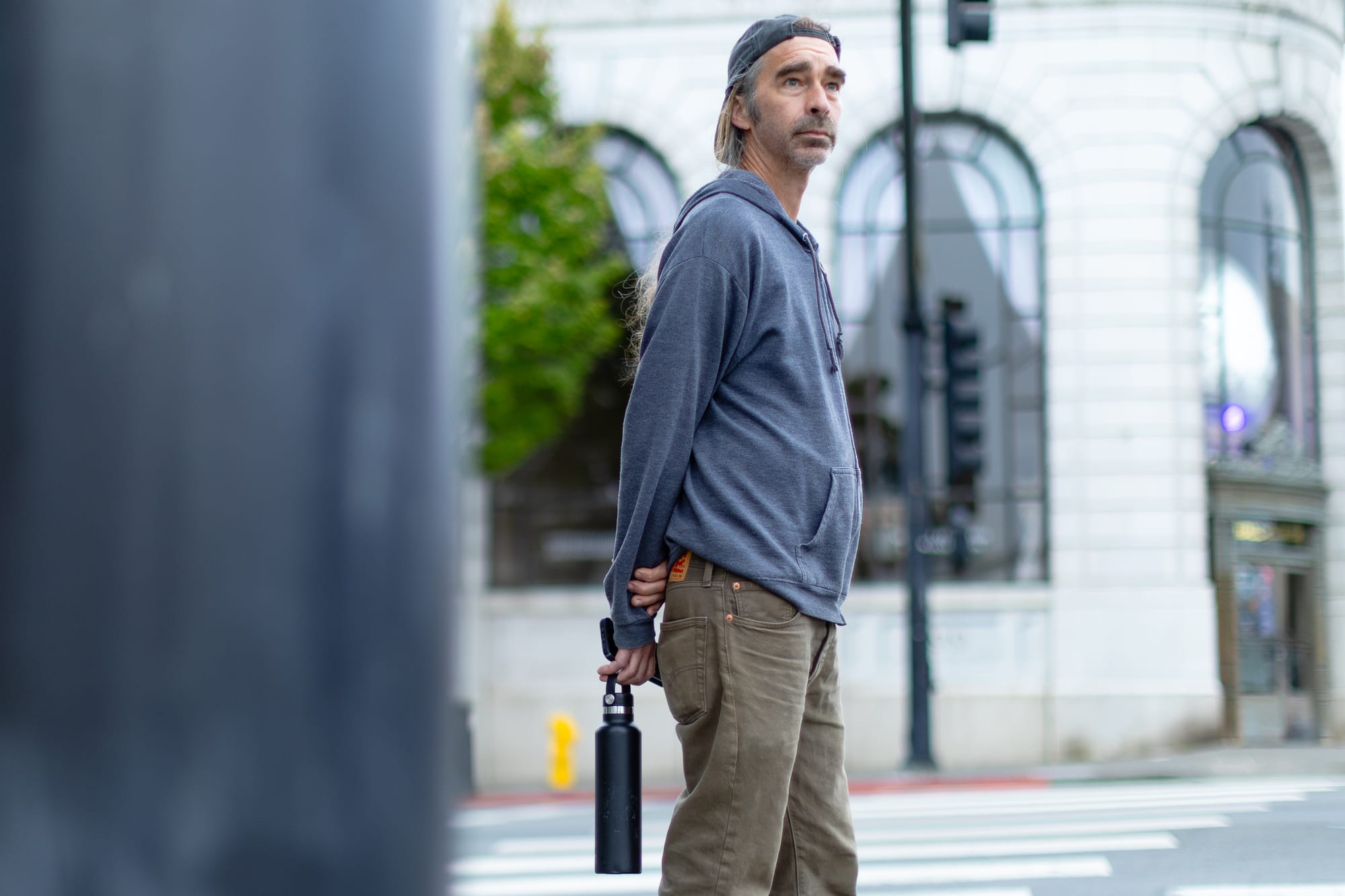
That’s the primary function of the new Adopt a Corner program, which was launched nationwide this summer by the National Day Laborer Organizing Network (NDLON). The organization has asked that anyone not at risk of deportation take action by becoming a consistent presence anywhere that day laborers gather, to build relationships and to offer protection. Here in Petaluma, volunteers usually stay until around 8am, after most of the laborers have either found work or given up for the day.
Following months of ramped-up ICE raids, incarcerations, and deportations since the Trump administration came to power in January, there’s a foreboding feeling among Sonoma County residents. While the region hasn’t experienced as elevated a level of ICE activity as Los Angeles, some residents fear that the events of the past few months are only the beginning: that L.A. is a testing ground for future expanded operations, and that increased harassment and arrests are inevitable here as well.
That has ramifications for a lot of people. Some 15% of the county’s roughly 485,000 residents were born outside of the U.S., with nearly two-thirds of those immigrants from Latin America, according to the 2021 Portrait of Sonoma County. Many of them are the workers who keep the county’s vineyards, farms, and other major industries running.

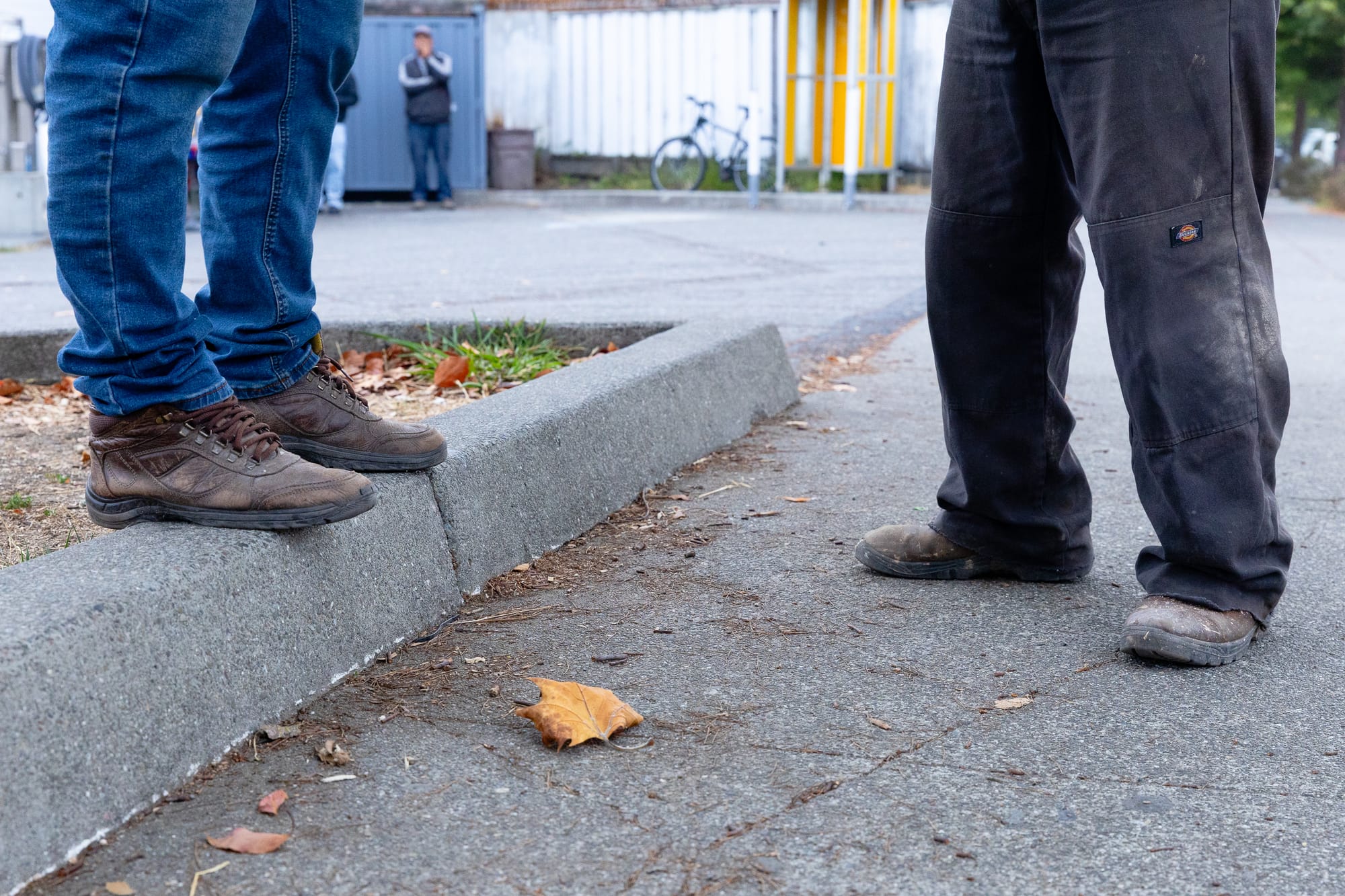
(L) Eric Leland, 53, monitors for ICE activity near a busy intersection in Petaluma. (R) Two day laborers 46, left and 52, wait for work outside of a busy gas station in Petaluma where day laborers gather. (Estefany Gonzalez/COYOTE Media Collective)
It’s that anticipatory fear that has led volunteers Eric Leland and local immigrant-support organizations like the Graton Day Labor Center to embrace an expanded role: that of protector in the case of surprise ICE raids. The nonprofit, which has provided resources, advocacy, and solidarity for local day laborers since 2007, is now working in conjunction with NDLON, and has been instrumental in training volunteers for this new job description.
The community-building is a big part of what drew Leland to the effort. He’s now one of 20 volunteers in Petaluma who meet weekly to strategize, alongside organizers from the Graton Day Labor Center. For the last two months, volunteers have chosen this particular corner because it’s a known place in the community where day laborers wait to be picked up and taken to job sites. In addition, it was the site of a potential ICE-related arrest in April of this year, according to the Press Democrat.
“The most important thing is to be respectful and responsive to what the day laborer community wants,” says Leland, who has a years-long background in doing immigrant defense and de-escalation work for activist-oriented groups in Sonoma County. “They are not interested in having heroes — they don’t want violence or high-visibility arrests. Our number one purpose is to be responsive and dynamic. We set up the table, listen to their needs, and respond.”

While growing up on a citrus farm in Southern California, Leland had lots of positive interactions with day laborers from Mexico and other Latin American countries. “I saw how hard people work and how friendly and dedicated they were,” he says. “I wanted to defend people that I know pretty well.”
The Graton Day Labor Center is a modest, one-story building that sits a block south of Graton Road in rural Sonoma County. Anita — whose last name COYOTE is omitting for her protection — is a regular at the Graton Day Labor Center, where the 54-year-old prioritizes finding work as a housekeeper.
In 2014, Anita arrived in the United States from Sonora, Mexico. She is currently working to stabilize her status in the United States, especially since the death of her daughter left Anita as a caretaker for a grandchild. “We need a pathway to citizenship so we can stop living in the shadows,” she says during a conversation in the day labor center’s courtyard.

Unfortunately, the notoriously labyrinthine immigration process has become even more challenging under the second Trump administration. In a recent report, the farmworker services organization California Human Development described the available pathways as “increasingly complex and bureaucratic, with longer processing times, making it difficult to achieve immigration goals.”
“They want to criminalize honest people doing honest work,” says Anita. Though she hasn’t directly experienced any interactions with federal agents locally, she still feels fearful, and also worries about the misinformation that spreads so easily on social media.
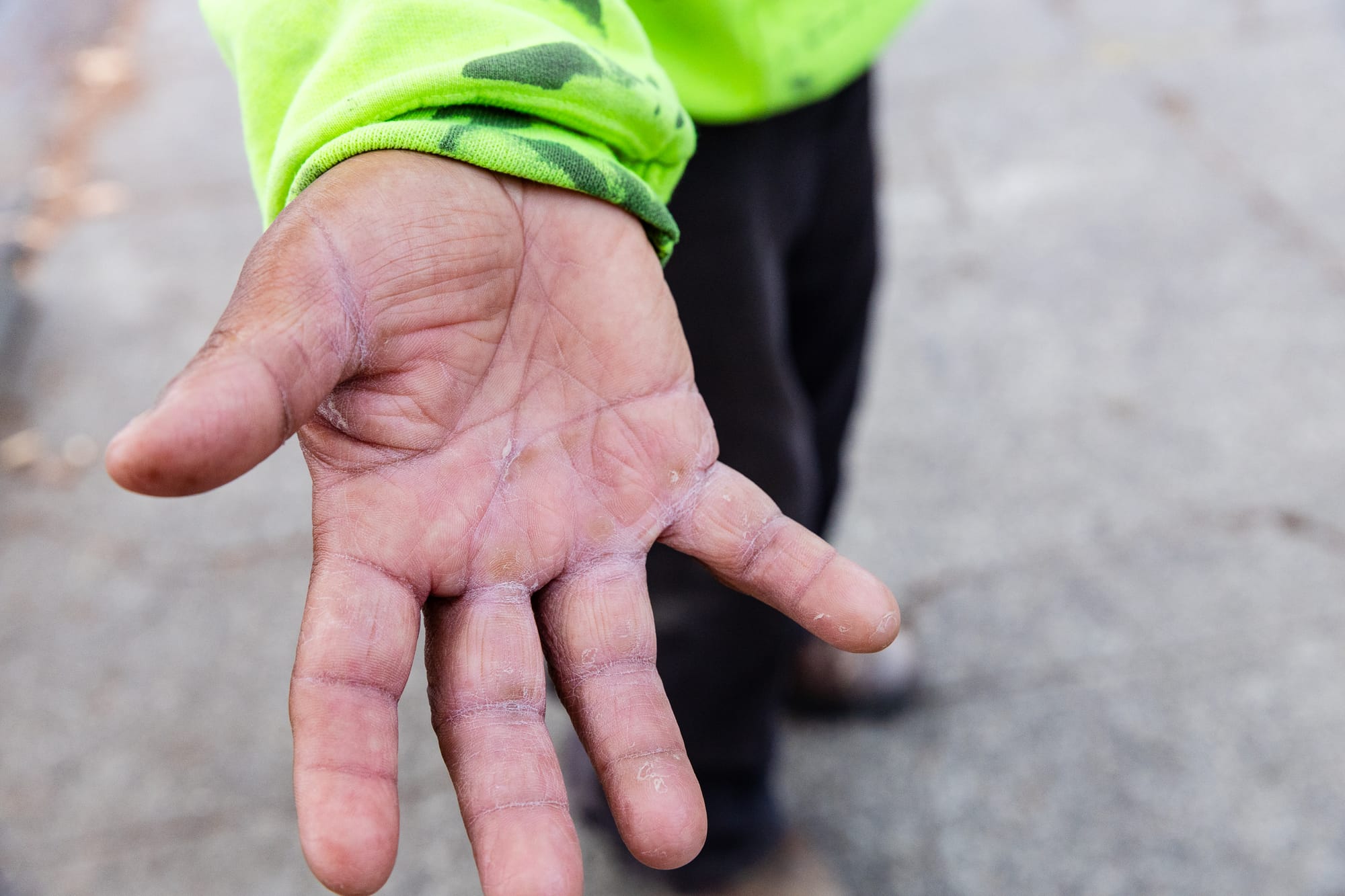
“People say that they’re out there when they’re not, and it creates panic. If you are the head of a household, you worry: Do I go out to work right now? Am I going to be able to come back and be here to take care of my family?” The Adopt a Corner program, which Anita calls “honorable labor,” has helped her feel nominally more secure.
Against a backdrop of so much uncertainty and fear, the program is a clear, concrete way people can help, says Karym Sánchez, a lead organizer at the Graton Day Labor Center.
“[The campaign] is really important at this moment because folks are bombarded with the news of raids and ICE activity and this is putting solidarity into practice,” says Sánchez. “Folks are always grateful to know that there are others that are also disgusted by what they’re seeing and want to do something about it.”

Heeding NDLON’s call to action was a natural fit, says Sánchez, as the day labor center already coordinates outreach at day laborer corners. And people from the North Bay Rapid Response Network, which disseminates information about the presence of ICE locally, have helped train volunteers as well.
But the guidance on exactly what’s needed at the adopted corner is coming from the workers themselves. Right now, workers are asking for vigilance, according to Sánchez. They are asking those willing to help to stay aware of signs of ICE during vulnerable early morning hours, when workers are standing on the street waiting for jobs.
“It’s very scary to be threatened by the authorities in this way,” says Leland. “A warning can give day laborers [enough] notice to remember to refer to their rights on the red cards, and allow time … that empowers them to seek their own safety.”
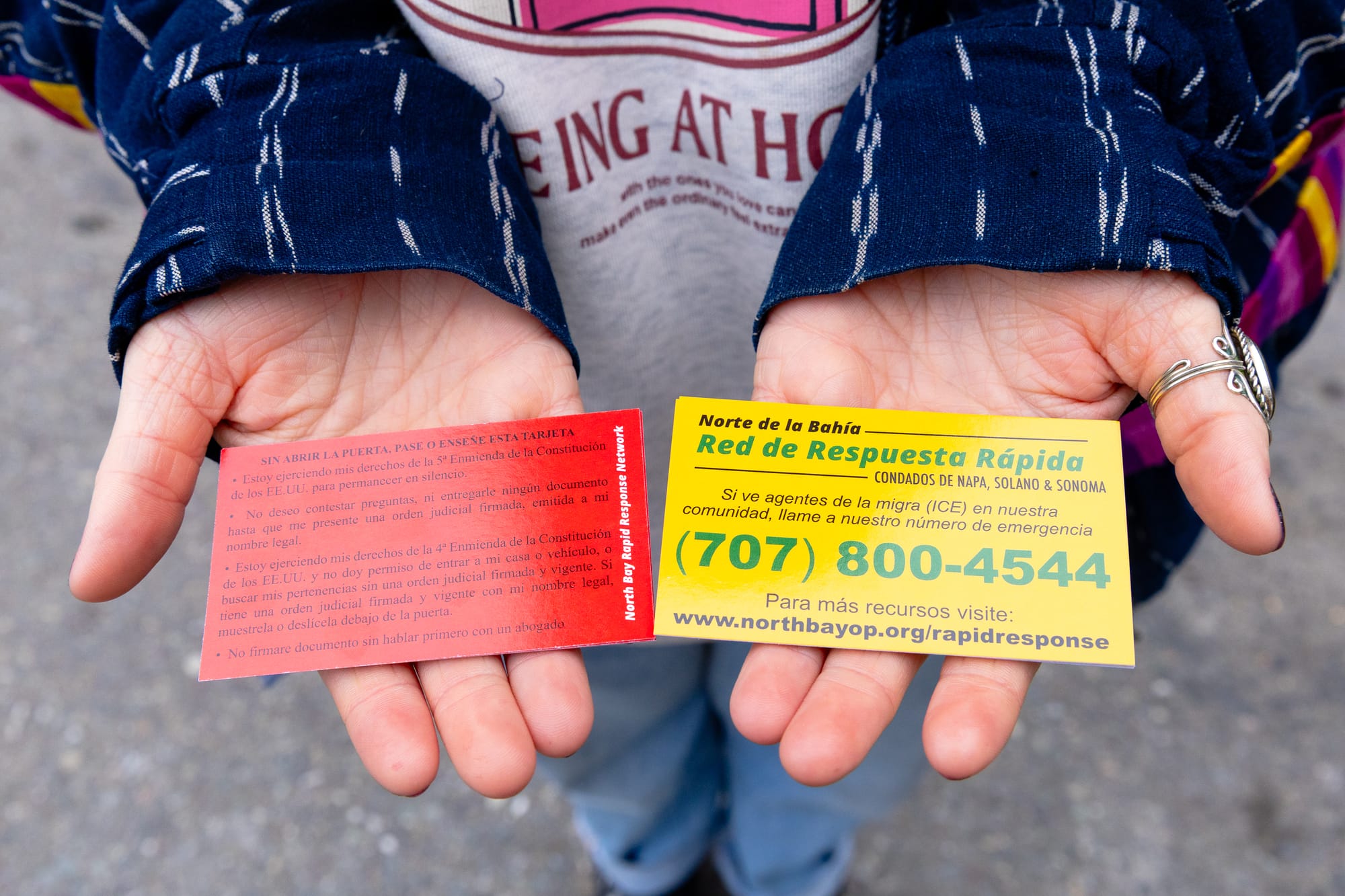
“A minute or two heads up that ICE is coming is enough to take action,” says Sánchez.
In August, a Republican-led Congress approved $75 billion in additional funding for ICE, making it the highest-funded law enforcement agency in the federal government. For now, ICE arrests in Sonoma County have been targeted and limited to specific individuals. But with $30 billion of those funds earmarked for enforcement and deportation operations, the potential for ICE operations in Sonoma County to escalate after the fall grape harvest lingers in the air like wildfire haze. Undocumented workers and the neighbors who are determined to protect them all worry that the worst is yet to come.
Jesús Sánchez, 56, (no relation to Karym Sánchez), another day laborer with longtime ties to Sonoma County, was born in Mexico but migrated to the U.S. at the age of 14 through an amnesty program. He has a green card and documentation papers. Still, he worries that if he travels, he won’t be allowed back into the country. Or worse, that his documentation won’t matter, depending on who he’s dealing with. “People in Los Angeles, even though they have green cards, they’ve had interactions with ICE,” says Sánchez.
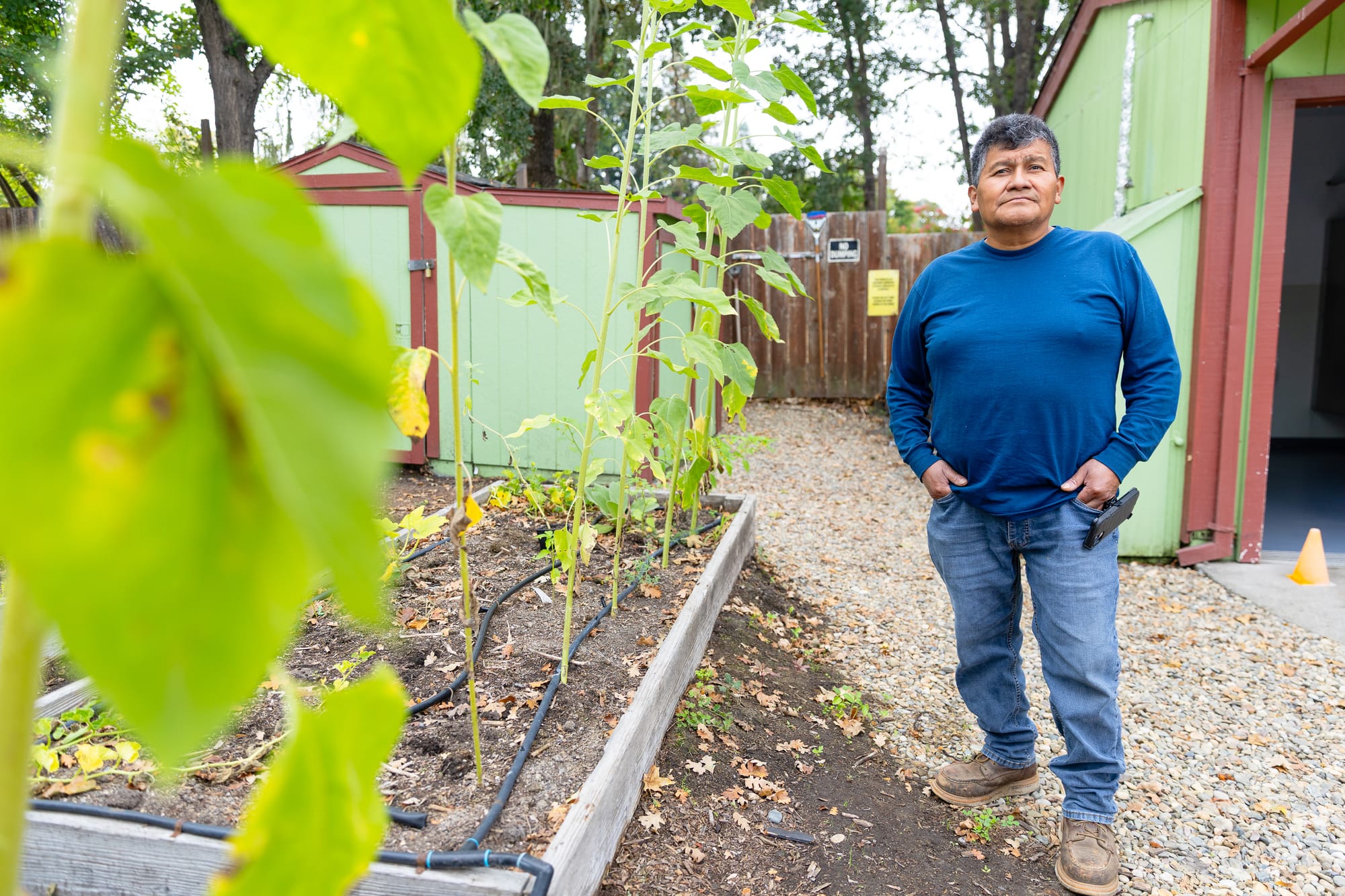
Choking up, Sánchez speaks about his worry that Trump’s inconsistency and aggression with world leaders will lead to war with other countries. He’s dealing with the pain by focusing on mutual aid, skill-sharing, and helping others out. For example, he’d like to teach carpentry skills to those who want to learn.
Karym Sánchez emphasizes the same point, noting there are several ways for less vulnerable people in the community to help. One is simply hiring day laborers. People still need to work, and they want to work.
“If you’re not sure where to start, call the day labor center and talk to the front desk — tell them what kind of work you’re looking for,” he says. “They’ll place a work order and workers will be sent out by a list system based on how long they’ve been waiting.”
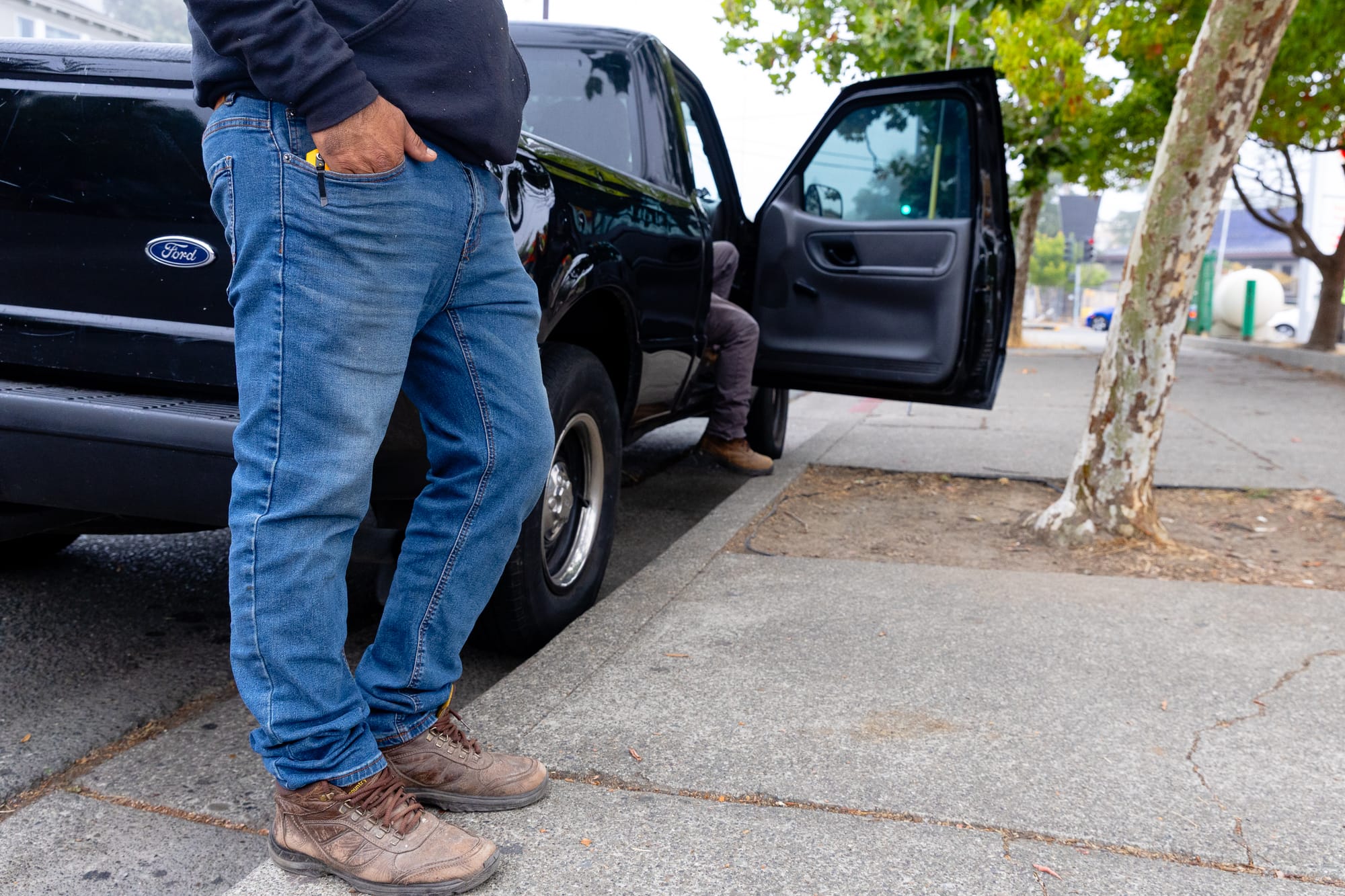
Sitting near him and nodding, Anita agrees. She’d like to do more housekeeping to keep the bills paid.
“We’re just looking … to do the things that other people don’t want to do,” she says. “We didn’t come here to hurt anybody. We just came to do some work.”
The Adopt a Corner program is seeking new volunteers. Reach out to Karym Sánchez at karym@centrolaboralgraton.org.

Born in East Los Angeles, Leilani Clark spent her early childhood in Hawaii before settling in Northern California. Leilani was previously published at Mother Jones, The Press Democrat, North Bay Bohemian, Civil Eats, KQED, Sonoma Magazine, and Time.
View articles